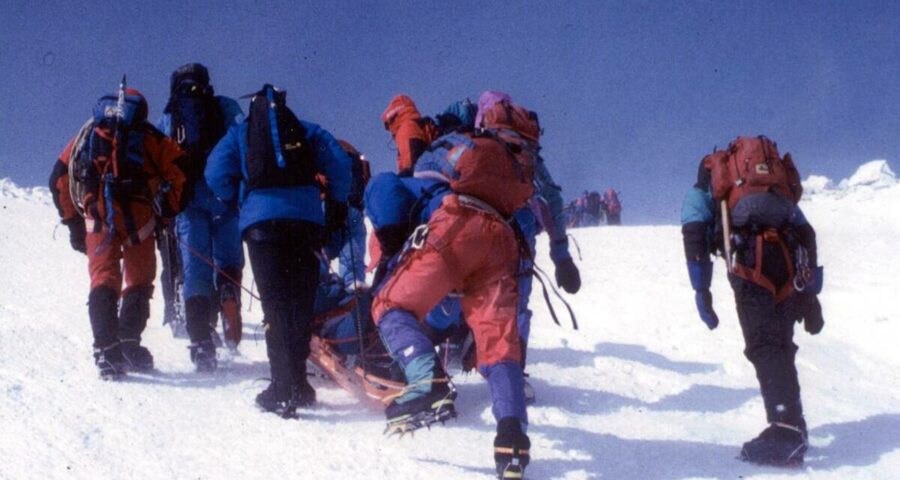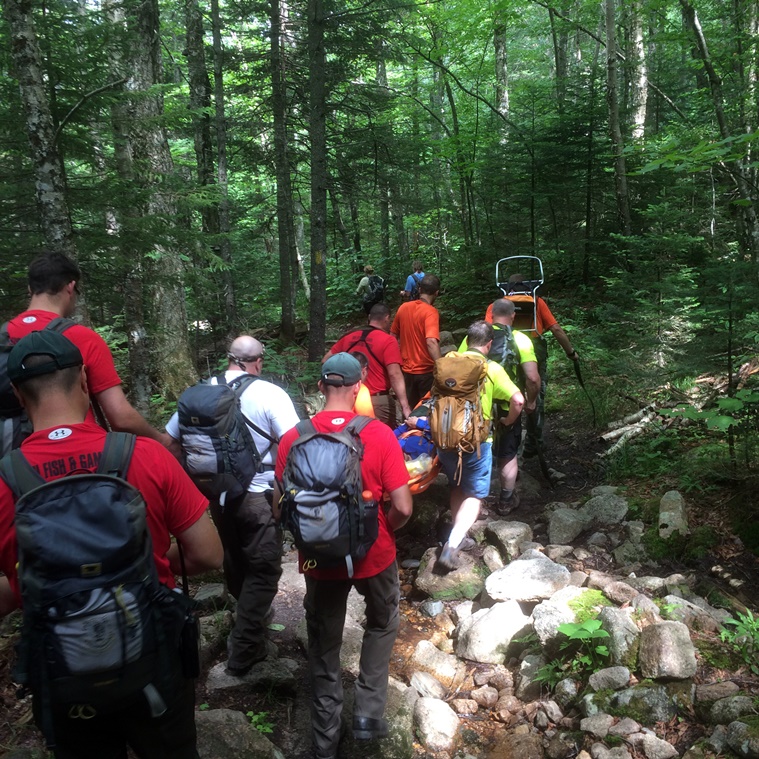The coronavirus pandemic has led to a surge of inexperienced hikers venturing into the outdoors. And that in turn has increased the pressure on search and rescue teams, as well as the costs.
Written By Claire Fahy
It was 11 p.m. one night last July when a couple realized they would not make it back down the Old Bridle Path. They were with their two children just over a mile into the popular hiking trail on Mount Lafayette, roughly 70 miles north of Concord, New Hampshire.
They had underestimated the time it would take to complete the hike and had been overtaken by darkness.
The couple and their children, who were tourists from Florida, did not have flashlights or water and were tired, so they called 911, according to Col. Kevin Jordan of the New Hampshire Fish and Game Department. Four officers found them around 12:30 a.m., gave them water and helped them back to the trailhead, Jordan said.
Now, in what has become an increasing trend in many states, New Hampshire plans to bill the family for the cost of the rescue. The total could be $5,000, Jordan estimated. The Florida family could not be reached for comment.
The coronavirus pandemic has led to a surge of inexperienced hikers venturing into the outdoors. And that in turn has increased the pressure on search and rescue teams, as well as the costs. Increasingly, states are looking for ways to penalize people who take unnecessary risks. But some question whether these laws might also discourage people from seeking help soon enough after putting their lives at risk because of an honest mistake.
New Hampshire passed a law in 2008 that allowed it to seek reimbursement if state officials deemed that a rescued person was negligent.
“We don’t do it very often,” Jordan said. “It’s got to be something that’s pretty wild, pretty out there. But one thing I am pretty strict on is being unprepared, because those are literally the things that cost lives.”
Five other states — Hawaii, Idaho, Maine, Vermont and Oregon — have similar laws allowing them to bill people for the cost of rescues in certain situations.
Hawaii has two bills pending that would allow search and rescue operators to seek reimbursement from those who strayed from hiking trails or intentionally disregarded a warning or notice, then had to be rescued.
And South Dakota passed a law to help offset search and rescue costs. In March 2020, Gov. Kristi Noem signed Senate Bill 56, allowing rescue agencies to charge each person as much as $1,000.
Eric Neitzel, a retired firefighter turned drone operator in Arizona who volunteers his services to search and rescue missions, thinks that a law patterned after the state’s Stupid Motorist Law should be adopted for hikers.
Though rarely enforced, the 1995 law said that if a driver drove through floodwaters then needed help, “the expenses of an emergency response are a charge against the person liable for those expenses.”
“Something needs to happen,” Neitzel said. “It’s kind of like regulating common sense.”
In June, the Phoenix Parks and Recreation Board voted to restrict access to popular hiking trails during periods of high heat. The action came after the United Phoenix Firefighters Association requested action to protect the well-being of emergency responders, The Arizona Republic reported.
Cases of unprepared hikers needing rescue — examples include those failing to dress appropriately for weather conditions or not bringing water on a hot day — have become increasingly common as more people enjoy outdoor recreation while the pandemic limits other activities, said Mark Doyle, the director of New Hampshire’s Division of Emergency Services and Communications.
“Those are the kinds of situations that people really find themselves, really, literally, sometimes up a creek without a paddle,” Doyle said.
In Colorado, local search and rescue teams are reporting record levels of requested rescues, with some teams seeing an increase in call volume of 200-300%, said Anna DeBattiste, a public information officer for the Colorado Search and Rescue Association.
Colorado has introduced legislation to provide more benefits to its search and rescue teams but does not plan to start charging for rescues.
“If you light your kitchen on fire, negligently, you don’t get charged for the fire department to come and put it out,” she said. “We know from experience that people who think they’re going to be charged delay calling.”
When the pandemic began, “the outdoors was the only game in town,” Jordan said. That meant a lot of inexperienced hikers were suddenly out on trails enjoying state and national parks.
Rescues used to be more common on weekends. Now they happen every day. “What we’re seeing is that our weekdays have become more like what our weekends are like, and our weekends have all become like what a holiday weekend used to look like,” said Scott Ellis, a spokesperson for the National Park Service.
Contributing to the problem is social media. Hikers can post photos of the vistas from high peaks without acknowledging the realities of reaching the summit.
“Sometimes people get excited,” said Katie Rhodes, president of the Adirondack Mountain Rescue in New York. “They’ll do a hike that’s considered quite challenging and thrilling, and they want to share it with the world.” New York does not charge for rescues, but some groups practice preventive search and rescue, educating park visitors about outdoor risks.
Most search and rescue teams in the United States are volunteer organizations, which adds to the strain, said Chris Boyer, executive director of the National Association for Search and Rescue. The numbers of rescuers shrank during the pandemic because older volunteers and others at risk stayed home, groups say.
Boyer’s organization does not endorse charging for rescues because if people need help, they should call right away without weighing the potential cost.
“Those couple of hours of pause might be the time that person is salvageable,” he said. “So I think that we let people call quickly and early because that means that we have a better chance of saving that person’s life, right?”
And while search and rescue operations are under strain, there will always be circumstances where people need to call for help.
“We were all beginners once and people are going to make mistakes,” Rhodes said. “They just are. We all do it. We’re all human.”
Source: Read Full Article



